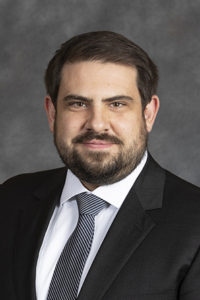Proposed tax credits reduced, advanced
A bill containing several proposed tax credits, including one to help Nebraskans offset expenses they incur when caring for a family member, advanced to the final round of debate April 10 after lawmakers amended it to reduce its cost.

Under LB937, introduced by Lincoln Sen. Eliot Bostar, a family caregiver would be eligible for a nonrefundable income tax credit equal to 50% of expenses incurred that are directly related to the care for and support of an eligible family member.
Total credits would be limited to $2.5 million per year beginning with tax year 2025.
As amended on general file, LB937 also contains provisions of several other bills heard by the Revenue Committee this session. On select file, Bostar offered an amendment, adopted 34-0, that he said would cap, delay or adjust various provisions to reduce the bill’s cost.
The amendment would limit total credits for caregivers to $1.5 million in fiscal year 2025-26 and FY2026-27 and $2.5 million in the following years.
LB937 would limit the total amount of credits available under the Nebraska Biodiesel Tax Credit Act to $1.5 million in calendar year 2025 and $2 million in the following years.
The amendment would limit the total to $1 million in FY2024-25 and $1.5 million in the following years.
Under the bill, film and television production companies could apply for a refundable income tax credit equal to at least 20% of their qualifying expenditures attributable to the production of films, documentaries and other qualifying projects in Nebraska.
LB937 would allow the state Department of Economic Development to approve no more than $1.5 million in credits annually. Bostar’s amendment would limit the total to $500,000 in FY2025-26 and $1 million in the following years.
The bill also would create the Individuals with Intellectual and Developmental Disabilities Support Act.
Under LB937, qualifying direct support professionals who care for individuals with intellectual and developmental disabilities could claim a refundable state income tax credit. Employers of direct support professionals could claim a nonrefundable credit.
The state Department of Revenue could approve a total of $2.5 million in credits under the act annually. Bostar’s amendment would limit the total to $1 million in FY2025-26, $1.5 million in FY2026-27 and $2 million in later years.
Currently, grocery stores, restaurants and agricultural producers may apply for a nonrefundable state income tax credit equal to 50% of the value of food they donate to food banks, pantries or rescues, up to a maximum of $2,500.
Under LB937, the department could approve up to $1 million in credits annually. The amendment would lower the cap to $500,000 in credits each fiscal year beginning in FY2025-26.
The bill would allow a producer or importer of sustainable aviation fuel to claim a nonrefundable income tax credit based on the number of gallons in all sold or used qualified mixtures.
Bostar’s amendment would allow the department to approve $500,000 in credits each fiscal year.
Under LB937, a Class III shortline rail company located wholly or partly in Nebraska could apply to the department for a nonrefundable tax credit equal to 50% of its qualified maintenance expenditures during the tax year beginning in tax year 2024.
The credit amount could not exceed $5,000 per mile of track, and the department could approve no more than $2 million in credits annually.
Under Bostar’s amendment, the credit could not exceed $1,500 per mile, and the department could approve no more than $500,000 in credits in FY2025-26 and $1 million in later years.
Under LB937, Nebraska taxpayers could apply to the department for a one-time, refundable state income tax credit of up to $1,000 to offset the cost of installing a reverse osmosis system at their primary residence if test results show high levels of nitrates, uranium or certain chemicals in the drinking water.
The department could approve a total of $1 million in credits each year. Bostar’s amendment would limit the total to $500,000 for FY2024-25 and the following two fiscal years and $1 million in later years.
Finally, LB937 would allow individuals, passthrough entities, corporations, estates and trusts to claim a nonrefundable credit of up to 50% of their state income tax liability on contributions they make to qualifying pregnancy help organizations.
Total credits would be limited to $2 million per year beginning in calendar year 2025. Bostar’s amendment would limit the total to $500,000 for FY2025-26 and $1 million for FY2026-27 and later years.
After adopting the amendment, senators advanced LB937 to final reading by voice vote.

